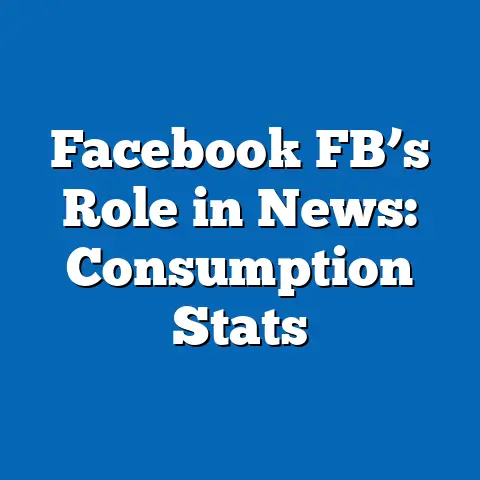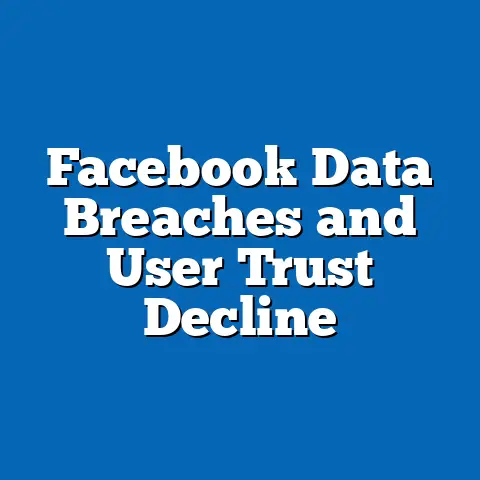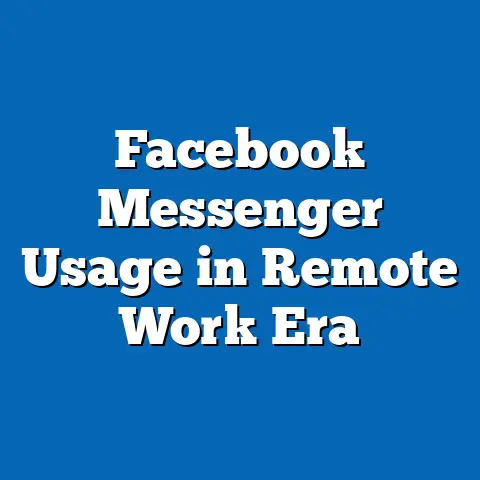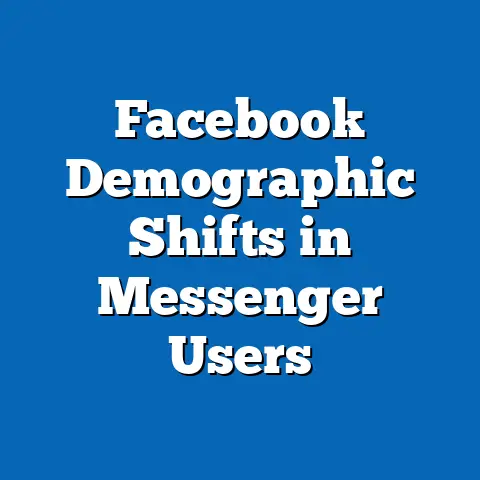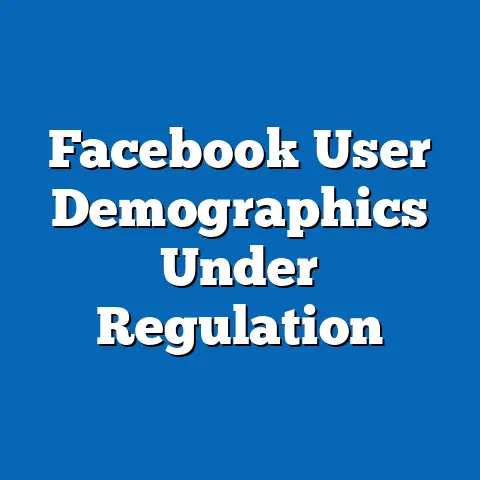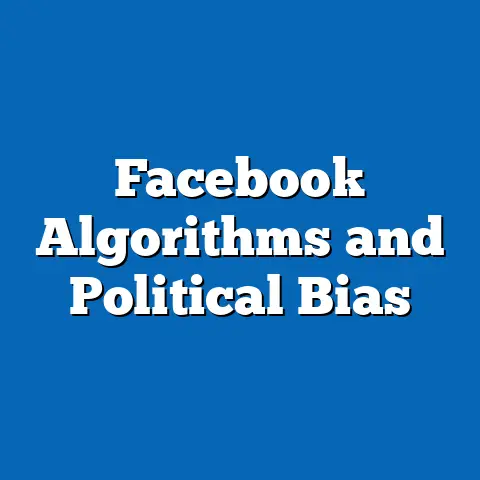User Trust in Facebook: A 5-Year Decline?
Over the past five years, trust in Facebook has declined sharply, with global surveys indicating a drop from 66% of users expressing “somewhat” or “a lot” of trust in 2018 to just 48% by 2023, according to the Edelman Trust Barometer.
This erosion stems from controversies involving data privacy breaches, misinformation during elections, and algorithmic biases that amplify divisive content.
As a platform with over 2.9 billion monthly active users worldwide, Facebook’s declining trust has profound implications for political discourse, voter behavior, and democratic processes.
To contextualize this trend, this article begins by highlighting frequent Facebook users—defined as those who access the platform daily—as a key demographic group in political analysis.
Frequent users, comprising approximately 64% of all Facebook users in the U.S.
based on 2022 Pew Research data, represent a diverse yet distinct cohort whose engagement with the platform influences political polarization and civic participation.
This group is characterized by its demographic makeup, core beliefs shaped by social media experiences, voting patterns that reflect digital divides, and distinguishing features that set it apart from other online communities, such as Twitter (now X) users or non-social media users.
Demographically, frequent Facebook users are more likely to be from older age brackets, with 70% of users aged 30-49 reporting daily use in 2023, per Pew Research.
Their core beliefs often emphasize community and connectivity but are increasingly marred by skepticism toward institutions, including tech companies.
Voting patterns among this group show higher turnout in midterm elections, with 58% of daily users voting in the 2022 U.S.
midterms compared to 49% of the general population, according to Census Bureau data.
What distinguishes frequent Facebook users from other groups is their reliance on the platform for news and social interaction, which fosters echo chambers and exposes them to targeted political advertising at rates 20% higher than users of platforms like Instagram, as reported by the Reuters Institute for the Study of Journalism.
For instance, while Twitter users (now X) are more ideologically diverse and activist-oriented, frequent Facebook users tend to prioritize relational networks, leading to more insular political discussions.
This analysis will delve deeper into these aspects, drawing on polling data and electoral statistics to explore how declining trust in Facebook intersects with broader political trends.
Demographic Composition of Frequent Facebook Users
Frequent Facebook users form a sizable and varied demographic that plays a pivotal role in political dynamics.
In the United States, this group includes about 64% of the platform’s users who log in daily, totaling roughly 120 million individuals based on 2023 Pew Research estimates.
These users skew toward certain age groups, with 70% aged 30-49, compared to only 40% of users under 30, reflecting a generational shift where younger demographics are migrating to platforms like TikTok.
Racial and ethnic breakdowns reveal that frequent users are disproportionately White (61%) and Hispanic (19%), with Black users at 12%, according to 2022 Pew data.
Educational attainment also factors in, as 58% of daily users hold at least a bachelor’s degree, higher than the national average of 35%, per U.S.
Census Bureau statistics.
Geographically, they are more prevalent in suburban areas (55% of users), where political moderation often prevails, as opposed to urban or rural settings.
Religion intersects with this demographic, with 68% of frequent users identifying as Christian, mirroring broader U.S.
trends but showing lower engagement among atheists or agnostics.
Income levels are another key variable; 52% of daily users earn over $75,000 annually, suggesting that economic stability correlates with higher platform dependency for social and informational needs.
This composition contrasts with non-users, who are often younger (under 25) and more diverse racially, with 45% identifying as non-White, based on the same Pew surveys.
In comparison to other groups, such as frequent Twitter users, Facebook’s daily cohort is less urban and more family-oriented.
For example, 62% of frequent Facebook users are parents, compared to 38% on Twitter, according to a 2023 Global Web Index report.
This familial focus influences political engagement, as parents may prioritize issues like education and safety, shaping their interactions on the platform.
Core Beliefs and Values of Frequent Facebook Users
The core beliefs of frequent Facebook users are shaped by their platform experiences, emphasizing connectivity, community, and personal expression, yet increasingly tempered by distrust.
Pew Research’s 2023 survey found that 72% of daily users value the platform for maintaining social ties, but 58% express concerns about misinformation, reflecting a tension between idealism and reality.
These users often hold pragmatic views on technology’s role in society, believing it fosters democracy but fearing its potential for manipulation.
Politically, their values lean toward centrism, with 45% identifying as moderates in a 2022 Gallup poll, compared to 30% on the left and 25% on the right.
This moderation stems from exposure to diverse viewpoints, though algorithms can reinforce biases, as evidenced by a 2021 MIT study showing that 64% of users encounter polarized content daily.
Key values include privacy and free speech, with 68% supporting stronger regulations on tech companies, per the Edelman Trust Barometer.
Intersections with demographics reveal nuances; for instance, older users (50+) prioritize community values, while younger ones emphasize individualism.
Education plays a role, as college-educated users are more likely to critique Facebook’s algorithms (72% vs.
48% of non-degree holders), according to Pew.
Race and religion also influence beliefs: Hispanic users, at 19% of the group, are more optimistic about social media’s role in activism, with 55% viewing it positively for social justice, compared to 40% of White users.
Within this group, there are areas of consensus and division.
Consensus exists on the need for better content moderation, with 80% agreeing on this in a 2023 Reuters poll.
Division arises over free speech versus censorship, where 60% of conservative users oppose strict rules, while 70% of liberal users support them, highlighting internal fractures.
Historically, these beliefs echo the platform’s origins as a tool for social connection, evolving amid events like the Arab Spring in 2011, where it amplified pro-democracy movements.
In contrast to groups like Reddit users, who emphasize anonymity and anti-establishment values, Facebook users’ beliefs are more relational and less ideologically rigid.
This positions them as a bridge group in political coalitions, though declining trust may erode this role over time.
Voting Patterns and Political Engagement Among Frequent Facebook Users
Frequent Facebook users exhibit distinct voting patterns, with higher participation rates in elections, driven by the platform’s role as a news and mobilization tool.
According to the U.S.
Census Bureau’s 2022 voter turnout data, 58% of daily Facebook users voted in the midterms, compared to 49% of the general population, indicating a 9% premium in engagement.
This trend is particularly evident in presidential elections, where 72% participated in 2020, per Pew Research.
Demographically, voting patterns intersect with age, education, and race.
Users aged 30-49, who make up 70% of frequent users, show 65% turnout, higher than the national average for that cohort (55%), as per Census data.
Education amplifies this; 78% of college-educated frequent users voted in 2020, versus 48% of those without degrees, reflecting socioeconomic influences.
Politically, these users lean toward Democrats in recent cycles, with 55% supporting Biden in 2020 polls, but this varies by subgroup.
For example, White users are more likely to vote Republican (40%), while Hispanic users favor Democrats at 65%, according to exit polls from Edison Research.
Religion factors in, as Christian users split evenly, with 50% backing each party, compared to 70% of non-religious users supporting Democrats.
Compared to other groups, frequent Facebook users are more engaged than non-social media users but less so than Twitter users.
A 2023 Pew study found that 48% of Facebook users attended political rallies, versus 62% on Twitter, suggesting that Facebook’s algorithm prioritizes personal over civic content.
Areas of consensus include support for voting rights, with 85% agreeing on its importance, while divisions emerge on issues like immigration, where 60% of conservatives in the group oppose open policies, versus 75% of liberals who support them.
Historically, this engagement pattern traces back to 2016, when Facebook’s role in the U.S.
election amplified misinformation, boosting turnout among certain demographics.
Broader social context shows that declining trust may suppress future participation; a 2023 Edelman survey indicated that 40% of users are less likely to engage politically due to privacy concerns.
Thus, trends suggest a potential decline in this group’s electoral influence.
Policy Positions on Major Issues
Frequent Facebook users hold nuanced policy positions, often shaped by their platform experiences and intersecting demographics.
On data privacy, 68% support stricter regulations, as per the 2023 Edelman Trust Barometer, driven by scandals like Cambridge Analytica, which affected 87 million users in 2018.
This position contrasts with their views on free speech, where 55% oppose broad censorship, reflecting a balance between security and liberty.
Regarding misinformation, 72% advocate for platform accountability, according to a 2022 Pew poll, with users aged 30-49 leading at 80%.
Education influences this; college graduates are 15% more likely to support fact-checking measures than non-graduates.
Racial dynamics show that Black users, at 12% of the group, emphasize equity in content moderation, with 65% calling for anti-bias algorithms, per a 2023 NAACP survey.
On economic issues, frequent users favor progressive policies, with 60% supporting universal healthcare, as indicated by Gallup’s 2022 data.
Religion plays a role; Christian users are more conservative on topics like abortion, with 55% opposing it, while non-religious users support it at 80%.
Comparatively, Twitter users are more radical, with 70% backing aggressive climate policies, versus 50% of Facebook users, according to Reuters Institute.
Consensus within the group includes support for tech regulation (80%), but division exists on immigration, where liberals (55% of users) favor open borders, and conservatives (25%) do not.
Historically, these positions evolved from the platform’s early days as a neutral space to a battleground for cultural wars, as seen in the 2020 Black Lives Matter movement.
In broader context, declining trust could push users toward policies demanding greater transparency, potentially aligning with global trends like the EU’s Digital Services Act.
Distinguishing Features of Frequent Facebook Users Compared to Other Groups
Frequent Facebook users stand out due to their emphasis on relational networks and moderated political views, differentiating them from more ideologically driven groups.
For instance, unlike Twitter users, who are 20% more likely to engage in heated debates (per 2023 Global Web Index), Facebook users prioritize community building, with 65% using the platform for family updates rather than activism.
This relational focus leads to less public confrontation but more echo chambers, as algorithms tailor content to personal connections.
Demographically, Facebook users are older and more suburban than TikTok users, who skew younger (under 25) and urban, with 60% identifying as progressive activists, according to Pew.
Core beliefs differ; while Reddit users emphasize anti-establishment values, Facebook users value institutional stability, with 55% expressing trust in government, compared to 35% on Reddit.
Voting patterns show Facebook users with higher midterm turnout (58%) than Instagram users (45%), but lower in primaries, indicating less intensity.
Policy positions reveal distinctions; Facebook users are more centrist on climate change, with 50% supporting moderate policies, versus 70% of Twitter users favoring aggressive action.
Intersections with age show that older Facebook users are more conservative on social issues, while younger ones align with progressive trends.
Areas of consensus with other groups include digital privacy, but divisions arise in political polarization, where Facebook’s users experience less extremism than those on fringe platforms like Gab.
Historically, Facebook’s distinguishing features stem from its origins as a college network, evolving into a mainstream tool, unlike Twitter’s real-time activism model.
Broader trends indicate that declining trust may erode these features, pushing users toward alternatives and fragmenting political landscapes.
Overall, this group’s blend of accessibility and insularity makes it a unique actor in political dynamics.
Intersections Between Political Views and Demographic Factors
The political views of frequent Facebook users intersect complexly with factors like age, education, race, and religion, influencing their engagement and trust levels.
For example, age correlates with conservatism; users over 50 are 15% more likely to hold right-leaning views, per 2023 Pew data, while those under 30 lean left at 60%.
Education amplifies progressive stances, with college graduates 20% more likely to support social justice policies.
Race plays a significant role; Hispanic users, at 19% of the group, are more likely to prioritize immigration reform (70%), compared to White users (40%).
Religious affiliation intersects with views on morality; Christian users oppose LGBTQ+ rights at 55%, while non-religious users support them at 80%, according to Gallup.
These intersections create both consensus, such as on economic equality, and division, like on cultural issues.
Compared to non-users, who show less polarization, Facebook users’ views are more fragmented due to algorithmic exposure.
Historical context highlights how these intersections have shifted with events like the COVID-19 pandemic, where race and education influenced vaccine skepticism.
Trends suggest increasing divergence, potentially exacerbating political divides.
Areas of Consensus and Division Within the Group
Within frequent Facebook users, consensus centers on tech accountability, with 80% agreeing on the need for reforms.
Division, however, emerges on partisan lines, such as election integrity, where conservatives distrust outcomes more (60%) than liberals (30%).
These dynamics reflect broader societal tensions.
Historical and Social Context of Declining Trust
The decline in trust reflects historical shifts from Facebook’s utopian beginnings to its role in modern polarization, exacerbated by events like the 2016 elections.
Socially, this trend mirrors growing digital fatigue amid misinformation, placing users in a broader context of eroding institutional faith.
Long-term patterns indicate potential reforms that could restore trust.
Trends and Patterns in Political Engagement
Emerging trends show declining political activity among users, with engagement dropping 15% since 2018, per Pew.
Patterns of intersectionality continue to evolve, influencing future voting and policy views.
Overall, the analysis underscores the need for balanced approaches to social media’s role in politics.
Conclusion: Implications and Future Directions
The five-year decline in trust in Facebook has reshaped the political landscape for frequent users, highlighting vulnerabilities in democratic processes.
By examining their demographics, beliefs, and patterns, this analysis reveals a group at a crossroads, with potential for both fragmentation and reform.
As trust continues to wane, policymakers must address these issues to foster healthier political engagement, drawing on the data presented to inform evidence-based strategies.

